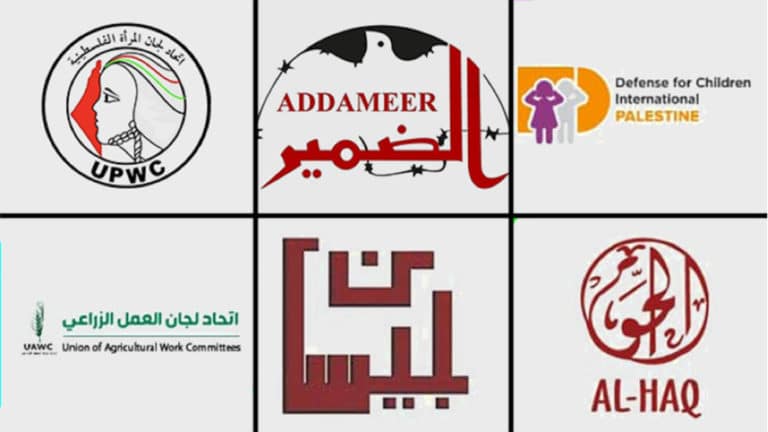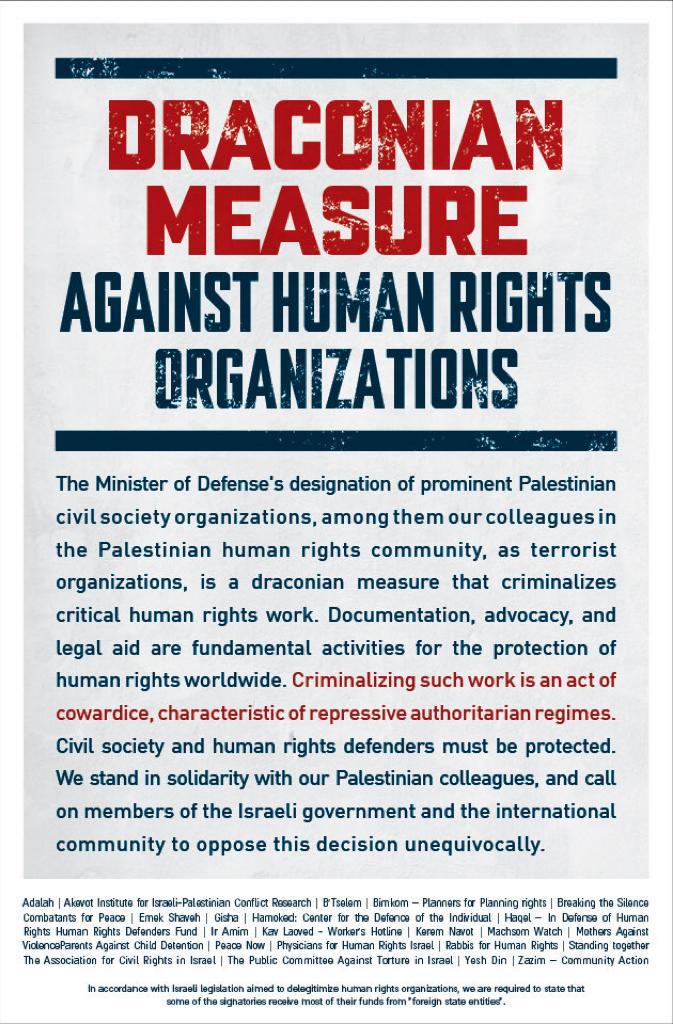
We’re curious…
Israeli Defense Minister Benny Gantz recently declared that the country was designating six Palestinian NGOs (or “nongovernmental organizations”) as terror groups. In a statement, Gantz said that though the NGOs operate under the guise of humanitarian aid, they’re actually an arm of the Popular Front for the Liberation of Palestine (PFLP).
What’s the PFLP? First, it’s considered a terrorist group by the U.S., Israel, the European Union, Canada, Japan and Australia. Some of the more notorious attacks the group carried out include the hijacking of an Israeli plane in 1968, and another four planes belonging to Western countries in 1970.
The organization also assassinated Israeli tourism minister Rehavam Ze’evi in 2001, carried out suicide bombings during the Second Intifada that killed 10 Israelis, and murdered five members of an Israeli family, including an infant, in 2014.
So, what is the alleged connection between the NGOs and the PFLP? According to the Israeli Defense Ministry, the six groups are using donations they receive — including grants from the European Union countries, the U.N. and other donors — to fund the PFLP and its terrorist activities. The Defense Ministry also claimed that the NGOs employ PFLP members, including “activists involved in terror activity,” in senior leadership positions.
The six NGOs are the Palestinian rights group Al-Haq; Addameer, which supports Palestinian security prisoners held in Israeli jails; Defense for Children-International, which advocates for Palestinian children; the Bisan Center for Research and Development; the Union of Agricultural Work Committees; and the Union of Palestinian Women’s Committees.
The Jewish National Syndicate reported that “under Israeli law, the designation now allows authorities to close the nonprofits’ offices, seize their assets and ban supporting their activities.”
The six groups rejected the charges and accused Israel of trying to shut down their efforts to hold Israel accountable for what they term “war crimes” against Palestinians, with Al-Haq writing in a press release, “Al-Haq will tirelessly maintain its efforts to ensure that Israeli perpetrators of mass atrocity crimes are held accountable.”
Meanwhile, in the U.S., Ned Price, a spokesperson for the State Department, said that the U.S. was not given a heads-up about the designations. Israel contested this, saying it did inform the U.S. beforehand and that it would send Shin Bet security officials to Washington to present “extensive and convincing” evidence linking the NGOs to the PFLP. Additionally, a group of progressive Democrats introduced a resolution in the House of Representatives strongly condemning Israel for labeling the NGOs terror groups.
With so many different angles of this story making headlines in Israel and around the world, we wanted to understand the conversation within Israeli society and the wide contours of dispute on this issue. What do Israelis think about these new designations? And, are these NGOs really connected to a terrorist organization?
Diversity of perspectives
Let’s start with a perspective from NGO Monitor, a watchdog group that tracks anti-Israel nonprofits. The group said on Twitter that the Israeli government’s announcement “confirms what our research has shown [for] years.”
The group cited data that shows that between 2014 and 2021 the governments of Netherlands, Spain, Belgium, Italy, Sweden, Denmark, Ireland Germany, France, Norway, Switzerland and the European Union gave more than €200 million (more than $240 million) to Palestinian NGOs with links to the PFLP.
1/Today, the Israeli Minister of Defense banned 6 NGOs for their affiliation with the PFLP.
— NGO Monitor (@NGOmonitor) October 22, 2021
In 2014-2021, EU governments and the EU gave €200 million to Palestinian NGOs with links (including senior officials) to the PFLP.
These NGOs are funded by:
🇸🇪 🇩🇪 🇮🇪🇩🇰🇨🇭🇳🇱🇳🇴🇮🇹🇪🇺🇺🇳🇧🇪🇫🇷
Eitan Fischberger, a communications associate for NGO Monitor, elaborated on this in a New York Daily News op-ed, posing the question, “Why are so many Americans taking the side of groups that work with terrorists?”
To demonstrate the connections between the NGOs and the PFLP, Fischberger highlighted the example of Samer Arbid, who allegedly commanded “the PFLP terror cell that murdered 17-year old Israeli Rina Shnerb in a 2019 bombing attack. At the time of the attack, Arbid, who is currently standing trial in Israel, served as the accountant for the Union of Agricultural Work Committees, one of the newly designated organizations.”
Meanwhile, The Jerusalem Post editorial board questioned why Gantz did not provide evidence like this when making the announcement. (Israel’s foreign ministry did reference a May 2021 investigation by Israeli security forces that found that millions of euros in aid were transferred from a network of European-funded NGOs to the PFLP. But, this was two days after the announcement.)
It was “just a statement to the media. No briefing or release of documents was made to prove the charges,” the Jerusalem Post editorial board lamented, adding that Israeli authorities should “back up what they claim with real evidence.”
They further argued that the Israeli government should have updated its American counterparts ahead of time: “Had Israel updated the State Department before [making the designations], it is possible that it would not have been condemned.”
Similarly, Transportation Minister Merav Michaeli said at a meeting with her fellow Labor party colleagues, “The manner in which this classification was carried out has caused great damage among our greatest and most important friends.”
The Haaretz editorial board went farther than this, criticizing not just how this was rolled out, but the designations themselves. “The government’s declaration…is a destructive folly that tarnishes all of the parties in the coalition and the state itself,” they wrote.
“From now on, there is no distinction between those waging a violent struggle against the state and hurting innocent civilians, on one hand, and on the other hand lawyers in human rights organizations who give prisoners legal aid…or document human rights violations in the territories.”
Gerald Steinberg, president and founder of NGO Monitor, pushed back on this argument, telling The Jerusalem Post, “There’s no justification for not considering or ignoring or overlooking the terrorist connections. These are not trivial. People — Israelis — have been killed.”
Steinberg identified employees of each of the six NGOs who are also connected with the PFLP. For example, “Al-Haq is headed by Shawan Jabarin, who sat in Israeli jail for a while [and] was convicted of being an activist member of the PFLP. The court ruled that he is a human rights worker by day and a terrorist official by night.”
Steinberg further stated that the PFLP members are not just “a few bad eggs” scattered among the staff of the NGOs, but that they are “in some cases, the heads of the organization” or in other senior roles.
However, 25 Israeli human rights organizations had a very different perspective on this. They signed a joint letter calling the designations “a draconian measure that criminalizes critical human rights work,” adding, “We stand with our Palestinian colleagues.”

How did the Palestinian NGOs respond? Al-Haq said in a statement, “The baseless allegations represent an alarming and unjust escalation of attacks against the Palestinian people in their struggle for freedom, justice and the right to self-determination…Israel’s widespread and systematic smearing of Palestinian human rights NGOs…aims to delegitimize, oppress, silence and drain their work and resources.”
Sahar Francis, the general director of Adameer, added that the decision “indicates that Israel is deeply concerned [about] the widespread work of our organizations. We have developed the discourse used in addressing this occupation [and] started to use words like ‘apartheid,’” adding that the success of the BDS campaign is “an example of the success of our work.”
Meanwhile, Michael Starr, a writer at The Jerusalem Post, attempted to reconcile these diverse viewpoints, observing that “two divergent narratives emerged in the wake of the decision.”
In one narrative, Starr wrote, “long-ignored terrorist activity cynically cloaked in the guise of human rights has finally been unmasked. The other narrative considers the six NGOs to be human rights organizations and considers the designation to be a draconian attack on Palestinian civil society.”
So, which reality is true? “The government hasn’t provided much information to prove its allegations,” Starr wrote. “But little has been done to dispute them other than to note the groups’ statuses as human rights NGOs. This leaves everyone else to make sense of the diverging realities. The NGOs have rejected the claims, but groups like NGO Monitor assert that there is enough open source documentation to prove that the only thing under attack is terrorism.”
Originally Published Nov 2, 2021 12:03AM EDT
